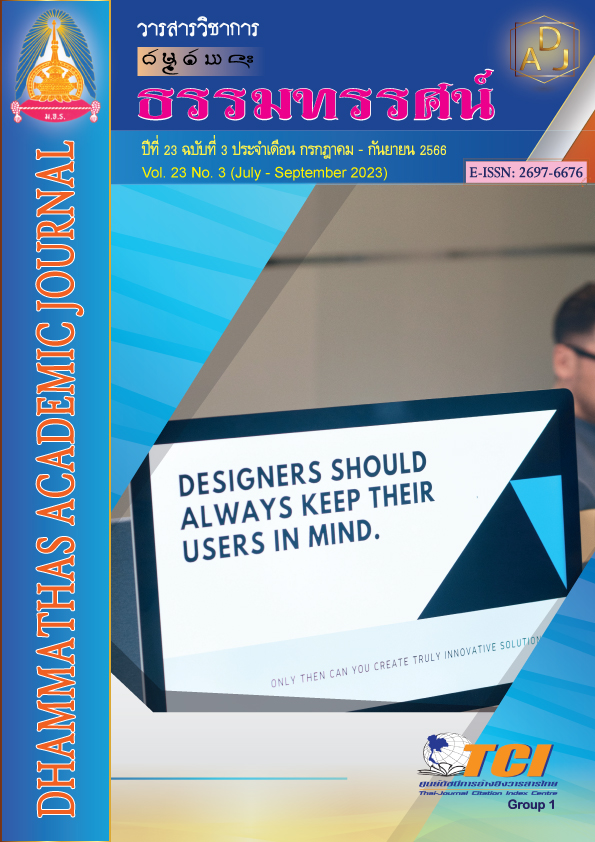The Characteristics of a Successful Teacher in Primary School: Case Study Grounded Theory
Main Article Content
Abstract
This study aims to draw theoretical conclusions of the characteristics of successful teachers by employing grounded theory to examine the features, developmental process, and factors that play roles on these characteristics. Purposive and snowball sampling were utilized to recruit 49 participants. A field study site was selected based on theoretical methods and the data were collected from documentary analysis, in-depth interviews, observations, and field notes. All data were transcribed, interpreted, and analyzed using NVivo.10. This study discovered three characteristics of successful teachers: knowledge, behavior, and teacher performance.
The findings reveal that:
1. The characteristics of successful teachers occur under certain conditions, both in- and out-of-institutional context.
2. In an in-institutional context, the conditions arise from personal, administrational, and political levels, whilst under the out-off-institutional context, the parents’ expectations were reported to be the condition that enriches the teachers’ characteristics.
3. The results also depict that the developmental process of successful teachers’ characteristics happens under the roles of effective management by the administrators and the teachers’ own professional performance.
4. Furthermore, the findings signify that the factors that play a role on the existence and disappearance of the characteristics are dependent on the administration style of the school directors, teacher self-performance, moral support from significant others, and participations from communities.
5. This research sheds light upon the positive consequences of successful teachers’ characteristics, and the findings could enhance learners’ academic development, teacher performance, and school recognition.
Article Details

This work is licensed under a Creative Commons Attribution-NonCommercial-NoDerivatives 4.0 International License.
เพื่อให้เป็นไปตามกฎหมายลิขสิทธิ์ ผู้นิพนธ์ทุกท่านต้องลงลายมือชื่อในแบบฟอร์มใบมอบลิขสิทธิ์บทความ ให้แก่วารสารฯ พร้อมกับบทความต้นฉบับที่ได้แก้ไขครั้งสุดท้าย นอกจากนี้ ผู้นิพนธ์ทุกท่านต้องยืนยันว่าบทความ ต้นฉบับที่ส่งมาตีพิมพ์นั้น ได้ส่งมาตีพิมพ์เฉพาะในวารสาร วิชาการธรรม ทรรศน์ เพียงแห่งเดียวเท่านั้น หากมีการใช้ ภาพหรือตารางของผู้นิพนธ์อื่นที่ปรากฏในสิ่งตีพิมพ์อื่นมาแล้ว ผู้นิพนธ์ต้องขออนุญาตเจ้าของลิขสิทธิ์ก่อน พร้อมทั้ง แสดงหนังสือที่ได้รับการยินยอมต่อบรรณาธิการ ก่อนที่บทความจะได้รับการตีพิมพ์References
กระทรวงศึกษาธิการ. (2556). พระราชบัญญัติการศึกษาแห่งชาติ พ.ศ. 2542 และแก้ไขเพิ่มเติมฉบับที่ 2 พ.ศ. 2545. กรุงเทพฯ: องค์การรับส่งสินค้าและพัสดุภัณฑ์.
จิรนันท์ บุญเพ็ง. (2564). แนวทางในการพัฒนาคุณลักษณะของครูในศตวรรษที่ 21 สังกัดสำนักงานเขตพื้นที่การศึกษาประถมศึกษาพิจิตร เขต 1. (การค้นคว้าอิสระการศึกษามหาบัณฑิต). พิษณุโลก: มหาวิทยาลัยนเรศวร.
ทวน เที่ยงเจริญ. (2563). การพัฒนาระบบการบริหารสถานศึกษาเพื่อความเป็นเลิศของสถานศึกษา สังกัดสำนักงานเขตพื้นที่การศึกษามัธยมศึกษา. (วิทยานิพนธ์ครุศาสตรดุษฎีบัณฑิต). ปทุมธานี: มหาวิทยาลัยราชภัฏวไลยอลงกรณ์ ในพระบรมราชูปถัมภ์.
ทิวัตถ์ ศรีดำรง. (2556). การบริหารสถานศึกษาสู่การเป็นโรงเรียนคุณภาพ: การสร้างทฤษฎีฐานราก. (วิทยานิพนธ์ปรัชญาดุษฎีบัณฑิต). อุดรธานี: มหาวิทยาลัยราชภัฏอุดรธานี.
ธมล เกลียวกลมทัต. (2562). รูปแบบการพัฒนาคุณลักษณะครูในศตวรรษที่ 21 ของโรงเรียนเอกชน จังหวัดชัยภูมิ. (วิทยานิพนธ์การศึกษามหาบัณฑิต). มหาสารคาม: มหาวิทยาลัยมหาสารคาม.
ปริยาภรณ์ ตั้งคุณานันต์. (2563). ความเป็นครูมืออาชีพ. (พิมพ์ครั้งที่ 3). กรุงเทพฯ: มีน เซอร์วิส ซัพพลาย.
ปารณทัตต์ แสนวิเศษ. (2555). การมีส่วนร่วมของชุมชนในการจัดการศึกษาขั้นพื้นฐานของโรงเรียนประถมศึกษา: การสร้างทฤษฎีจากฐานราก. วารสารบริหารการศึกษา มศว, 9(16), 69-82.
เผด็จ อมรศักดิ์. (2558) การพัฒนารูปแบบองค์การแห่งการเรียนรู้ในธุรกิจอุตสาหกรรมที่เป็นเลิศ. (วิทยานิพนธ์ปรัชญาดุษฎีบัณฑิต). กรุงเทพฯ: มหาวิทยาลัยเทคโนโลยีพระจอมเกล้าพระนครเหนือ.
พิชญาภา ยืนยาว. (2562). ครูมืออาชีพในศตวรรษที่ 21. โครงการตำรามหาวิทยาลัยราชภัฏนครปฐม. นครปฐม: มหาวิทยาลัยราชภัฏนครปฐม.
ยนต์ ชุ่มจิต. (2553). ความเป็นครู. (พิมพ์ครั้งที่ 5). กรุงเทพฯ: โอเดียนสโตร์.
เลขาธิการสภาการศึกษา. (2564). ข้อเสนอระบบการเรียนรู้ที่ตอบสนองการเปลี่ยนแปลงของโลกอนาคตในปี 2040. กรุงเทพฯ: อิเลฟเล่น สตาร์ อินเตอร์เทรด.
วันทิตา โพธิสาร. (2563). การบริหารสถานศึกษาอาชีวศึกษาสู่ความเป็นเลิศ: การสร้างทฤษฎีฐานราก. (วิทยานิพนธ์ปรัชญาดุษฎีบัณฑิต). อุดรธานี: มหาวิทยาลัยราชภัฏอุดรธานี.
สราวุฒิ นิ่มนวล. (2565). รูปแบบการบริหารสถานศึกษาเพื่อพัฒนาคุณภาพของครูผู้สอนในศตวรรษที่ 21 สังกัดสำนักงานเขตพื้นที่การศึกษามัธยมศึกษาเพชรบุรี. (ดุษฎีนิพนธ์ปรัชญาดุษฎีบัณฑิต). กรุงเทพฯ: มหาวิทยาลัยนอร์ทกรุงเทพ.
Ahmad, R. H., & Manaf, Z. A. (1997). Characteristics of effective and less effective schools in rural and urban setting: A case study from Malaysia. Journal of Educational Research, 25(6), 183-205.
Clark, O. M. (1995). Thoughtful Teaching. London: Cassell.
Hargreaves, A. (2003). Teaching in the knowledge society. New York: Teachers College Press.
Hoy, W. K. & Miskel, C. G. (2013). Educational administration: Theory research and practice. (9th ed.). New York: McGraw-Hill.
Janelle, C. (2019). Characteristics of a 21st -Century Teacher. Retrieved from https://www.thoughtco.com/characteristics-of-a-21st-century-teacher-2081448
Lisa, V. (2010). Is this a promising time for teacher leadership?. London: Cassell.
Marquardt, M. J. and Reynolds, A. (1994). The Global Learning Organization. New York: IRWIN.
Stadt, R. W. (2003). Managing career education programs Englewood Cliffs. New York: Prentice-Hall.
Strauss, A. L. & Corbin, J. M. (2015). Basic of Qualitative Research: Techniques and Procedures for Developing Grounded Theory. (3nd ed.). Thousand Oaks: Sage.
Winter, J. (2011). Effective Teacher Behaviors Evident in Successful Teacher of Students with Emotional and Behavioral Disorders. New York: Manhattanville College Purchase.

